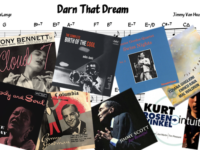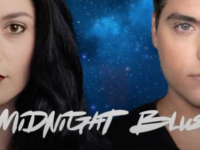by Nick DeRiso
Clarinetist Roger Campbell has turned an enduring passion for swing legend Benny Goodman into a sizzling six-piece jazz project called After Midnight. It’s perhaps no surprise, then, that a new live effort finds him slithering his way through “Memories of You,” legendarily performed by Rosemary Clooney with Goodman in the mid-1950s. That’s Campbell scooting and shouting on “Benny’s Bugle,” too. Live at the Sacramento Jazz Jubilee even employs the same instrumentation (clarinet, vibraphone, piano, guitar, bass and drums) as Goodman’s legendary sextet.
But this isn’t just about Benny. The Littleton, Colo.-based After Midnight isn’t simply aiming to rehash routines made famous in a series of dusty old LPs.
For instance, “Autumn Leaves,” an old French love song turned jazz standard, opens the album with a round-house swing. Rather than stick within the staid conformity of older, more familiar big-band renditions, Campbell plays with a refreshing modernity. Greg Harris’ turn at the vibes is a rumbling delight, too. “Lady Be Good,” the Gershwin favorite, is later given a randy ragtime makeover by pianist Justin Adams.
Vocalist Jodi Rene offers a soaring, emotionally raw take on “Smoke Gets in Your Eyes,” written by Jerome Kern and made famous by the Platters. Rene then joins guitarist Mike McCullough on vocals for “Comes Love,” as well as on “Bei Mir Bist Du Schon,” originally a Yiddish song which roughly translates into “To Me, You’re Beautiful.”
The conversational interplay with McCollough on “Comes Love,” perhaps definitively covered by Ella Fitzgerald, offers Rene a chance to dig deeper into a growling, R&B-flavored sensuality. McCollough’s Wes Montgomery-esque bop solo meshes perfectly with the lithe rhythm put down by bassist Herrick “Ced” Forsyth and drummer Jim Moore. Rene also brings a jumping verve to “Bei Mir Bist Du Schon,” this thrilling update of the Andrews Sisters’ original – the first-ever chart-topping song for a female group.
Not all of it works. There are times when After Midnight slips back into the safety of the comfy cliché, starting with Cole Porter’s “Begin the Beguine.” After a torrid reimagining by Artie Shaw, it went on to become one of swing music’s most notable warhorses, and unfortunately sounds like it here. After Midnight puts in a staid performance, following in step with McCollough’s too-mannered vocals. Even an impish solo by Campbell, recalling his tutelage under Ken Peplowski and Joe Lukasik, can’t goose this one into a fresh revelation. Similarly, “The World is Waiting for the Sunshine,” famously done by Gene Krupa, doesn’t do enough to distinguish itself from earlier, better-known renditions.
Those moments, however, are few and far between on the thoroughly enjoyable Live at the Sacramento Jazz Jubilee, an album of numerous mix-and-match pleasures. Campbell’s clarinet powers the Latin-tinged “Frenesi,” an early jazz standard originally written for the marimba before it topped the charts for Artie Shaw. McCollough goes on to make a series of stabbing guitar runs before giving way to a fun bass feature by Forsyth. Harris and Campbell enliven “Lullaby of the Leaves,” an old Tin Pan Alley favorite, with all of the mid-century optimism associated with West Coast jazz.
Pianist Justin Adams then gently underscores the melancholic delight that made “Memories of You” the perfect sendoff for the finale of the Johnny Carson-era “Tonight Show.” “Benny’s Bugle,” though it begins with the top hat-and-spats formality of the original, is goosed into the next era of jazz by After Midnight’s propulsive rhythm section. Harris adds a series of cascades on the vibraphone, then McCollough offers a witty reply, moving the song into an elegant swagger.
That’s a perfect description, in fact, for the bulk of After Midnight’s effort here. Live at the Sacramento Jazz Jubilee makes room for the excitement of modern jazz, even as it retains all of swing music’s expected old-school sophistication.
- Nick DeRiso’s Best of 2015 (Rock + Pop): Death Cab for Cutie, Joe Jackson, Toto + Others - January 18, 2016
- Nick DeRiso’s Best of 2015 (Blues, Jazz + R&B): Boz Scaggs, Gavin Harrison, Alabama Shakes - January 10, 2016
- Nick DeRiso’s Best of 2015 (Reissues + Live): John Oates, Led Zeppelin, Yes, Faces + others - January 7, 2016




